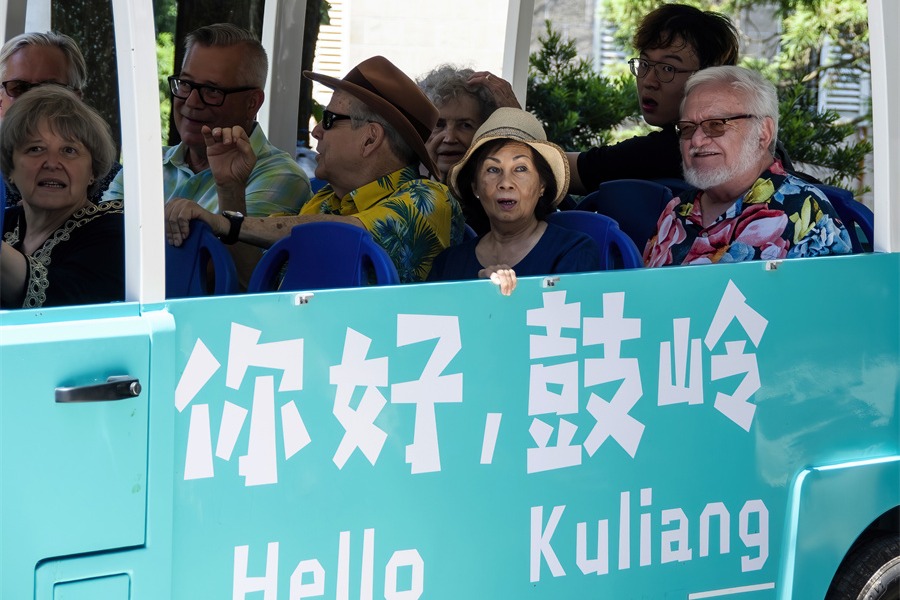China can help fight terrorism in SE Asia
By Zhou Bo | China Daily | Updated: 2017-11-13 07:13
 |
| File photo shows Philippine President Rodrigo Duterte supporters gather during a vigil backing the anti-drugs crackdown at the Luneta park in metro Manila, Philippines February 25, 2017. [Photo/Agencies] |
Duterte was referring to Chinese military assistance to the Philippines in two shipments in June and October, which included high-precision rifles, sniper rifles, automatic rifles and ammunition. Beijing's assistance was aimed at strengthening Manila's campaign against the IS group-inspired terrorists.
Radical Islamic and jihadi groups in Southeast Asia such as Jemaah Islamiyah, Abu Sayyaf, al-Qaida and the offshoots of terrorist outfits are almost as diversified as the fauna in its tropical forests, but what is most alarming is the speed of their rise and their affiliation to the IS group. No wonder Singaporean Prime Minister Lee Hsien Loong has called Southeast Asia a "key recruitment area" for the IS group.
Besides, ever-worsening humanitarian situation and violence in Myanmar's Rakhine Province add to the fear that extreme Islamists from elsewhere in Southeast Asia and beyond might try to exploit the plight of the Rohingya refugees for their gain. Plus, the Sulu Sea around southwestern Philippines has become a new haven for pirates and armed robbers. According to the International Maritime Bureau, they were responsible for 71 percent of global incidents in 2015, and the number of maritime kidnappings last year hit a 10-year high.
China has huge stakes in the peace and stability of Southeast Asia, as it is ASEAN's largest trading partner while the Association of Southeast Asian Nations is its third-largest trading partner. Southeast Asia is also a vital link in the China-proposed 21st Century Maritime Silk Road and one of the most popular tourist destinations among Chinese nationals.
Also, it is vital to cut off the Southeast Asia route between the IS group and Xinjiang separatists who use the region as a gateway to join the terrorist outfit in Iraq and Syria. And a bomb explosion in Bangkok in August 2015 that killed 27 people and left 120 injured was confirmed to be a "revenge" attack against the Thai government for its help to China in nabbing Xinjiang separatists smuggled into Thai territory.
That most of the ASEAN member states have purchased or received through donation some kind of Chinese weapons to combat terrorists shows China can help Southeast Asia fight terrorism through military assistance. And the fact that the largest quantity of the Chinese assistance requested by Duterte comprised 6,000 rifles (along with bullets for them) indicates that some countries' under-equipped militaries might still need such basic help from China.
It is no less important for China to help in capacity building, through mechanisms such as joint training, joint patrol, and when necessary, joint operation. China and Thailand have held quite a few counter-terrorism drills at the tactical level, which could be extended to include other countries, and the Chinese and Vietnamese navies regularly patrol the Beibu Gulf. Moreover, in response to the brutal killing of 13 Chinese sailors on the Mekong River in October 2011, law enforcers from China, Laos, Myanmar and Thailand conducted 63 joint patrols along the river to prevent attacks on cargo vessels.
Can China help combat maritime terrorism in the Sulu Sea? If the Chinese navy can combat piracy in the Gulf of Aden, why it can't do so in a region closer to China? Duterte has invited the Chinese navy to conduct joint exercises with the Filipino navy around Mindanao and in the Sulu Sea. This is a progress from his earlier remark that he would invite only the Chinese coast guard to patrol there. But since joint exercises, however useful, cannot end piracy, the ongoing joint patrol by Malaysian, Indonesian and the Philippine navies is not enough to cover an area that is much larger than the Strait of Malacca currently patrolled by four littoral states.
Therefore, Duterte should invite other ASEAN countries and international navies, including the Chinese navy, to conduct joint patrols there. Remember, it took the navies of more than 20 countries almost five years to keep the pirates at bay in the Gulf of Aden and Somali Basin.
The author is an honorary fellow at the Center of China-American Defense Relations, PLA Academy of Military Science.
- Philippine FM lauds China's positive role in Southeast Asia
- China hopes to promote development of Philippine ties
- Philippine President Duterte declares liberation of Marawi city from terrorists
- China's Alipay introduces offline e-payment system into Philippine market
- Philippine police prepare for upcoming 31st ASEAN Summit
- Philippine fears over AI influx
























